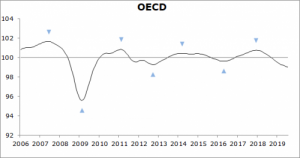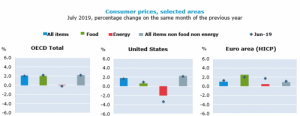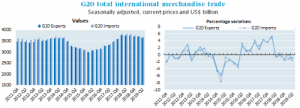More efforts needed to boost trust in business and finance
Policy makers should step up their efforts to bolster public trust in finance to reduce the risks of contagion if economic growth and financial returns continue to fall, according to a new OECD report.
Composite Leading Indicators (CLI), OECD, September 2019
US Stocks Soar After Announcement of New Trade Talks With China
U.S. markets soared Thursday on news the United States and China have agreed to hold new trade talks.
The Dow Jones industrial average climbed 372 points. The Standard & Poor’s 500 Index was also up more than 1 percent, while the Nasdaq...
Consumer Prices, OECD - Updated: 3 September 2019
Northern Bahamas ravaged by 'disaster of epic proportions' as UN releases $1 million in emergency funds

US Coast Guard Air Station Clearwater, Florida, responds to the devastation in the aftermath...
International trade statistics: trends in second quarter 2019
GDP Growth - Second quarter of 2019, OECD
Growth of real gross domestic product (GDP) in the OECD area slowed to 0.5% in the second quarter of 2019, compared with 0.6% in the previous quarter, according to provisional estimates.
Governments must take further action to boost job opportunities at an older age
In the face of rapid population ageing, governments must promote more and better job opportunities at an older age to protect living standards and the sustainability of public finances, according to a new OECD report.
Bangladesh Receives $185 Million World Bank Financing for Renewable Energy
The government of Bangladesh signed on August 29, a $185 million financing agreement with the World Bank to add about 310 MW renewable energy generation capacity, which will contribute to reliable, affordable electricity and cleaner air.
Water and Sanitation Subsidies Need to Better Benefit the Poor, Says New World Bank Report
Water and sanitation subsidies are disproportionately benefitting the better-off, according to a new report from the World Bank. The study finds that across a number of low and middle-income countries 56% of the subsidies are captured by the richest...









